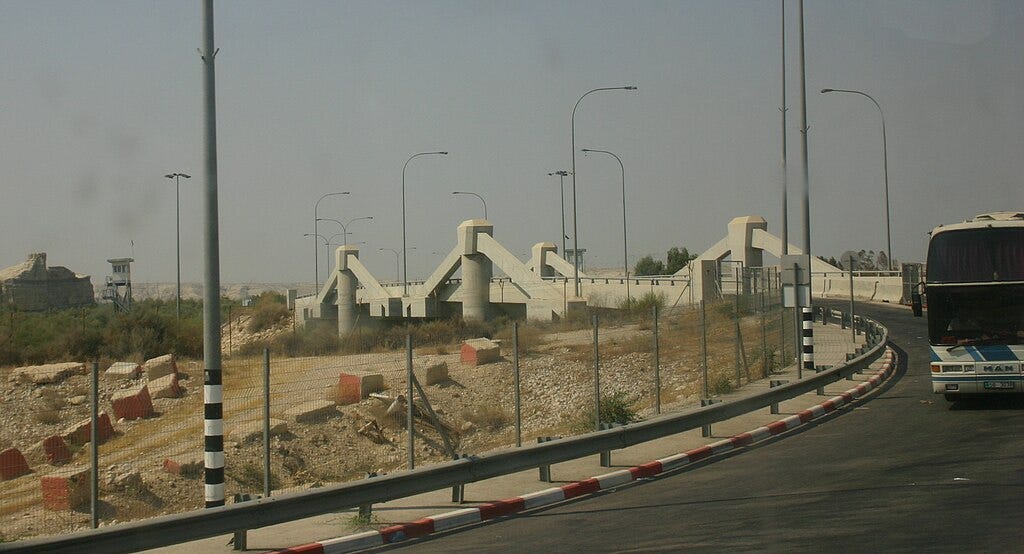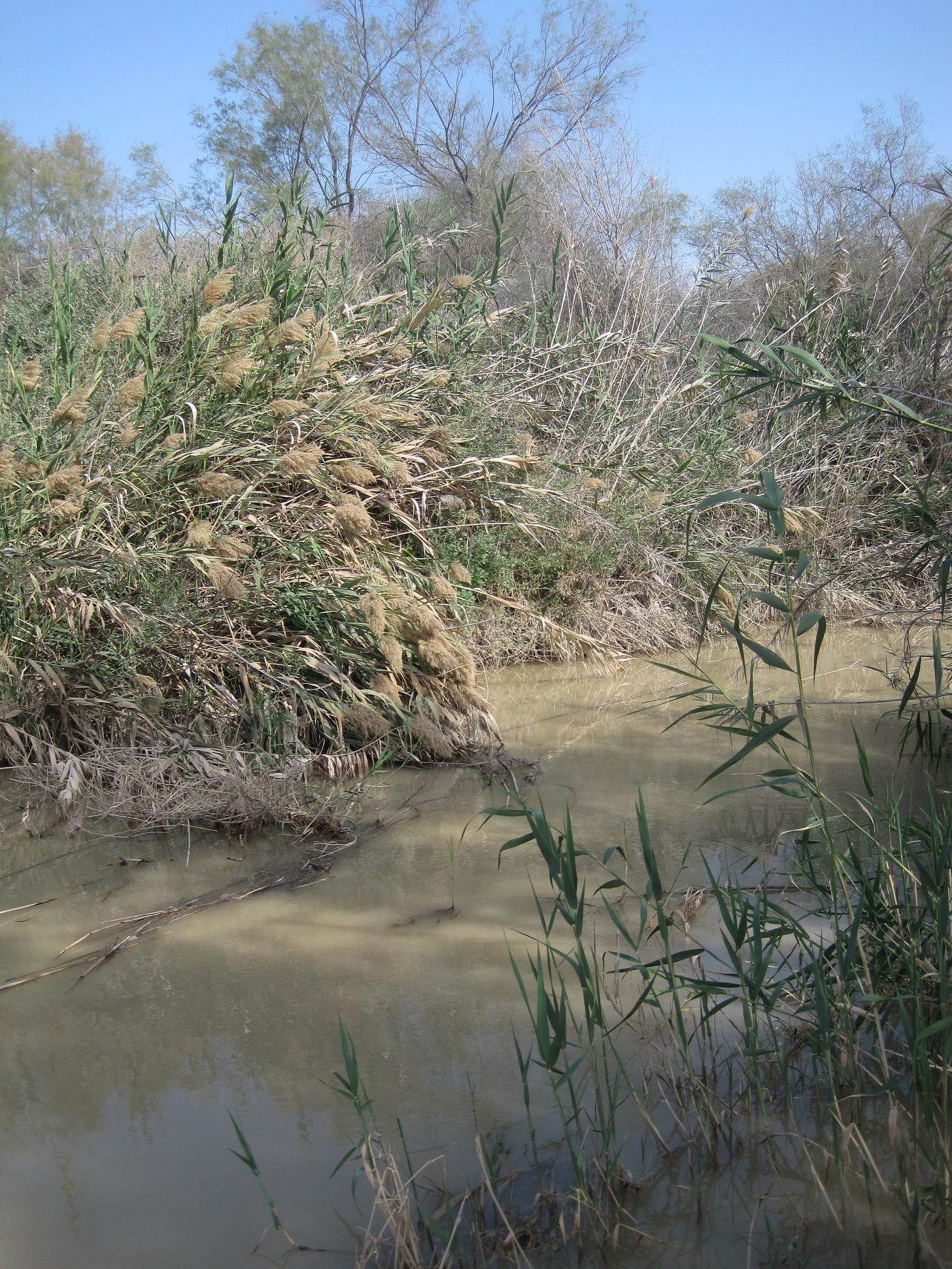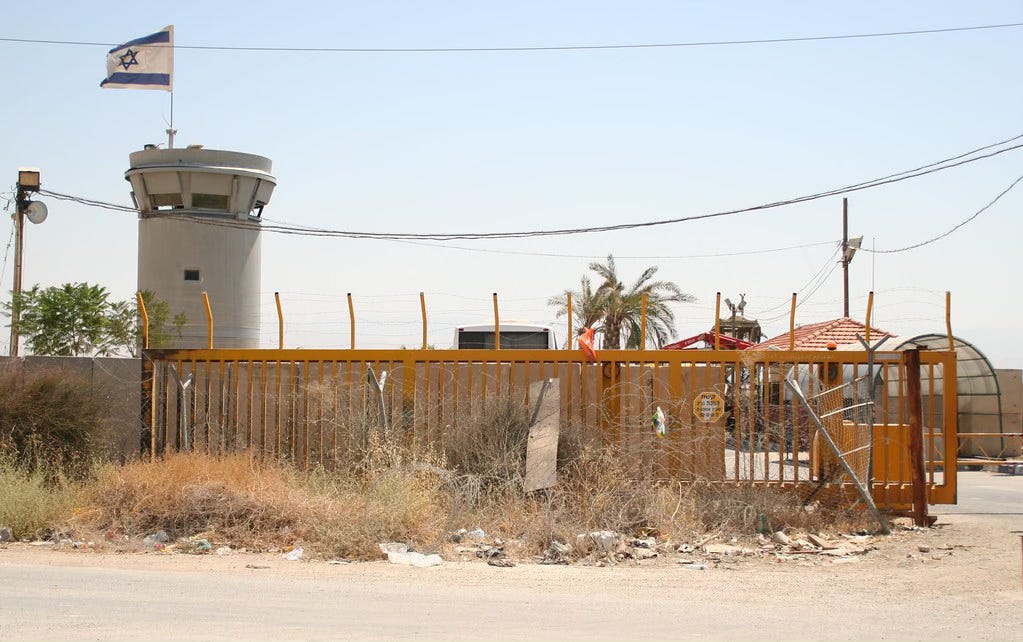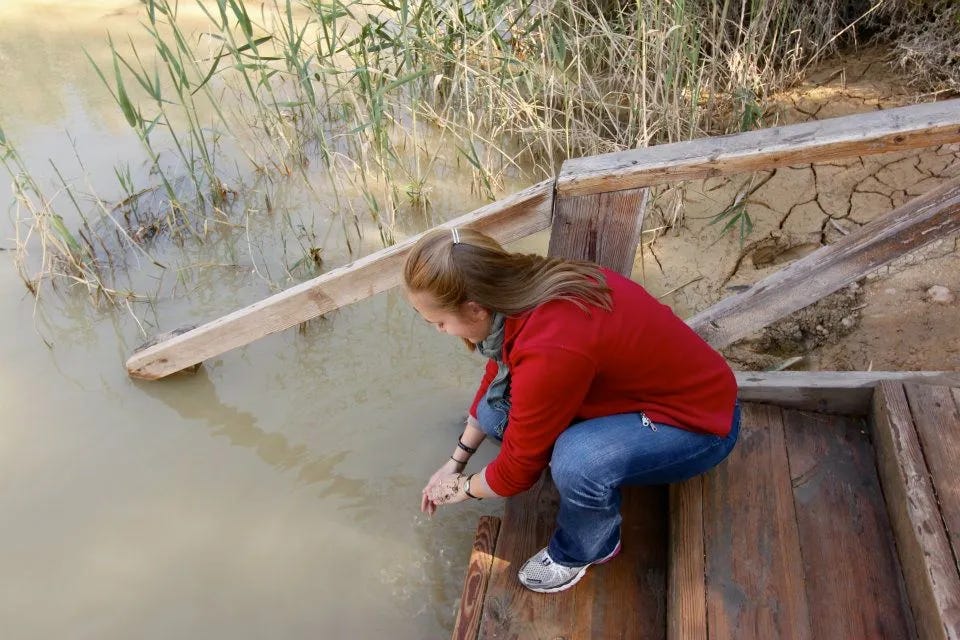What’s in a name? Stories of interrogation at the Israeli border
For years I didn’t write about some of my experiences in Israel-Palestine, because I wanted to ensure I could return.
Looking at my dad from behind plexiglass, an Israeli soldier asks him, “Why did you name your daughter ‘Jordan’?”
We had just crossed the river of the same name, which runs between the West Bank and the country which shares my name, too. It was the spring of 2014, and I was wrapping up my year on a Fulbright research grant in Amman, Jordan. My parents and now-husband came to visit me, so we could travel to the Holy Land together. Over the next week, we planned to visit Jerusalem, Bethlehem, Nazareth, and ancient sites along the Sea of Galilee—as long as we weren’t tripped up at this border crossing first.
We had already taken a taxi down into the Jordan River valley, toward the Dead Sea, the lowest point in the world. The car wound around brown, rocky hills dotted with green. When we reached the border, we first went through the Jordanian exit process, paying a fee, and then taking a bus with other travelers across the river. The Jordan is so narrow at this location—more like a stream— that we could barely see it during the crossing. Then we reached the Israeli side to be processed again.
This border crossing, often known as the Allenby or King Hussein Bridge, connects Jordan and the West Bank, one of the two Palestinian territories (the other being Gaza). Yet the crossing is controlled by the Israeli government and military. That’s because the West Bank, which was intended to be part of the land for an eventual Palestinian state, has been occupied by Israel since 1967. That means that Israel controls the West Bank’s borders and much of its internal civil and military affairs (something I’ve discussed here and here).
The crossing is mainly used by Palestinian residents of the West Bank, as well as tourists. Palestinians, including Palestinian-Americans, have often been barred from using Israel’s Ben Gurion airport in Tel Aviv. Instead they have to fly in and out of Jordan, and cross through the Allenby Bridge.
The first time I went through the crossing in the spring of 2012, my friend, Caroline, and I stood in a line of what seemed like hundreds of people, mostly Palestinians and Jordanians (many of whom are of Palestinian origin). It was hot and crowded on the Israeli side, and we were situated near a frail, elderly woman. When she reached the front to be processed, a young Israeli soldier treated her gruffly. It was my first taste of the humiliation that Palestinians are often made to experience at the hands of the occupying force in the West Bank. On that trip and subsequent ones, I would see this humiliation at Israeli military-run check points, and when soldiers would climb onto city buses with their guns visible, requiring young Palestinian men to temporarily or permanently leave the vehicle.
Then it was Caroline’s and my turn. As our friends in Jordan had advised us, we asked that the border guards not stamp our passports, but instead a piece of paper that we’d keep inside our passports. At the time, this was a common request of tourists who hoped to later visit Lebanon or other countries that do not have diplomatic relations with Israel and won’t allow in people who have an Israeli passport stamp. The Israeli border guards asked us about our purpose of visiting—tourism—and we told them the places we planned to go. Jerusalem and the Sea of Galilee (which are in Israel proper), and Bethlehem (which is in the West Bank). We’d also been told by Jordanians to emphasize that we were there to visit holy sites—we were visiting during the Christian Holy Week, which also coincided with Passover that year—to lessen any suspicion that we might be visiting the West Bank for political or activist reasons.
Caroline passed through without issue, but the border guard took a bit more time with me. After giving her my passport, she looked at my name. “Jordan Denari” is a strange one in that part of the Middle East. Not only do I share my first name with the Arab country and the river which abuts it, but my last name sounds quite similar to the Jordanian currency, the dinar. (Both Denari and dinar trace their linguistic roots back to the currency used during the Roman empire.) Back in Amman, people would chuckle with happiness when they learned my name—it was a great icebreaker and it helped begin conversations with countless cab drivers. But on the Israeli border, it induced a curiosity that wasn’t so positive. The border guard typed something into her computer—presumably my name—and spent a while reading the screen. When she was done, she took the large stamp and plunged it down, right onto my passport, where the ink quickly dried. The guards let me through, and didn’t interrogate me further, but I knew a visit to Beirut was now out of the question.
I will never know what the solider was doing on her computer. But I suspect that she and the colleague who stood beside her Googled my name and found my articles and essays on Islam. In college, I’d published a bit on Islam and my experiences of Muslim-Christian dialogue. It wasn’t much—mostly blogging and one published piece, and nothing on Israel-Palestine—but it seems to have been significant enough to ruffle the soldier’s feathers. Dialoging with Muslims and trying to upend anti-Muslim stereotypes shouldn’t be problematic, but being Muslim or Arab, or seeming to sympathize with them, is often met with ire at the Israeli border. There are a couple dynamics at play. First, closeness with Muslims is often viewed (rightly or wrongly) as synonymous with support for the Palestinians. And second, Israel benefits from Islamophobia; if Americans and others have negative perceptions of Muslims (including Palestinian Muslims) it makes the subjugation of the Palestinians all the more palatable. As we walked away from the window, I took a mental note: anything you write could be Googled and used as reason to deny you entry next time.
Before and after that trip, I heard lots of stories from Arabs, white Americans, and others who’d gone through much, much worse at the Allenby Crossing or at Ben Gurion airport: forced to wait for hours without their passport; searched and patted down in undignified ways; interrogated about religion, family, and other personal matters; and insulted and treated as inferior. In some cases, travelers were turned away completely, especially those who were known to participate in activism on behalf of Palestinian rights. Knowing all of this, and having had my own suspicious experience, when I returned from the Holy Land I didn’t write anything publicly about what occurred at the border, not to mention the injustices I witnessed.
The second time I returned to the Allenby Crossing, to visit the Holy Land during the fall of 2013, was less memorable. My passport was already stamped—no stress there—and I don’t recall any unique treatment by the guards. But then in the spring of 2014, I went through with my family. Having done the complicated procedures before, I guided them along and we finally made it to the window on the Israeli side. My now-husband, a tall, young white man with a noticeably European name, breezed through. But the guards spent more time with my parents and me, especially my dad. My dad is white, and white-passing in virtually all contexts, but with his dark hair and strong features, and with a last name like “Denari”—which sounds Arabic to many in the Middle East—my dad was a curiosity to the Israeli guards. They asked about his family background—“Italian”—and then looked to me.
“Why did you name your daughter ‘Jordan’?” he asked.
It was like an accusation. What good reason could he have for naming this girl Jordan, the name of this Arab country next door? A name that seems connected to those we’ve decided are our enemy…
My dad’s response was unhelpfully wishy-washy. “Well, I just liked the name.”
I knew that was true—it’s what my dad has always said, that he just liked the name. My mom’s pick had been “Allison” or “Allie,” but after her long and difficult labor with me, she conceded in the delivery room to my dad’s choice and I was named Jordan. Thirty-plus years ago, they definitely didn’t have the River Jordan on their minds, and they could not have predicted that my name, with its Middle Eastern origin and biblical connections, would end up being so reflective of the trajectory of my life.
But at the security window with the Israeli guards, I was afraid that “I just liked the name” wasn’t going to cut it.
“You know Michael Jordan?” I piped in. “My dad is a basketball fan and in the ‘90s when I was born, Michael Jordan was a big deal. So that’s why you liked the name, right, Dad?” I said turning to him.
My dad, perhaps not realizing what was going on and keen on being honest, pushed back a bit. He’d always insisted that MJ was never the inspiration for my name. But I knew that we needed a reason better than vague affinity to convince the guards that we Denaris didn’t have Arab background or sympathies that they’d find problematic.
Eventually, the guards seemed to accept our wishy-washy Michael Jordan answer, and let us move on to the rest of our journey. Our experiences at the border were, relative to what many others face, incredibly easy and smooth. But the anti-Arab and anti-Muslim racism and suspicion baked into Israel’s border process became even more apparent to me through the interaction with my dad.
I’m only writing about this now, nearly ten years after our family trip to the Holy Land. I’d wanted to share about it long ago, along with many other troubling things I witnessed there. But I was concerned that if I wrote about Israel-Palestine, I wouldn’t be let back in. I also had concerns that writing publicly on this topic could cause issues for me in the U.S. Many Americans, from professors to journalists to students, have been sidelined, chastised, doxxed, or fired because they shed light on the injustices faced by Palestinians at the hands of the Israeli state. So I kept quiet.
It was something of a selfish calculus, and I knew it. But it was early in my career, and I hoped I’d get to return to the Holy Land one day. Fortunately in 2020—right before the pandemic—I did. I was invited to take part in an interfaith pilgrimage to Israel-Palestine with other faculty and staff at Georgetown, with a cohort made up of Catholics, Protestants, Jews, and a Muslim.
On that trip, we flew into Ben Gurion airport. It was the easiest border experience by far, especially because I was with a large American tour group. I wasn’t asked questions individually, though some members of our group were on the way out. The pilgrimage took us to several cities across the West Bank and Israel proper; not only did we pray in numerous historic religious sites, but we also met and talked with many Israelis and Palestinians about the reality of life and the major political and social injustices there. Upon leaving, I knew that with four trips to Israel-Palestine under my belt, I’d had more than my fair share of visits—many of my Palestinian friends will never have chance to go. I knew that I now needed to write, to share what I’d seen, even if it jeopardized my chances of return.
It was Israel’s bombardment of Gaza in 2021, and the more recent assault of 2023–24, that resolidified my resolve to write publicly. I published a piece in Commonweal in 2021, writing about the structural violence that Israel imposes on Palestinians in the West Bank (and that rarely receives media coverage). And since the massacres by Hamas on October 7 and the Israel’s unprecedented assault on Gaza’s civilians, I’ve done additional writing and speaking on the longstanding injustices that preceded the latest violence, including a detailed essay about the 2020 interfaith pilgrimage. Some of the things we saw on that trip I can never write about, not because I don’t want to—they are eminently important issues—but because it would put Palestinian individuals at risk.
I know that, in many ways, all of this writing is too little too late. If I—and the many other Americans who have traveled to the Holy Land and have seen similar things—had shared these stories sooner, maybe things would be a bit different now.
As disappointing as it would be to not return to the Holy Land—I love that place deeply—I’ll be content with the four incredible experiences I’ve had, which outnumber what most people will get. Many Palestinians, whether they live in the West Bank, Gaza, or in the diaspora, have never been able to visit the sites I have, to walk through and become familiar with the places from which their ancestors hailed. Unlike me, they have been denied the chance to feel the spray of the sea water of the Galilee, to smell spices wafting down the stone corridors of Jerusalem’s Old City, and to touch the tombs of Jesus, Abraham, and other holy figures.
It may turn out that, one day, I will get to return. Even despite my writing, as a white Catholic woman I will undoubtedly face fewer barriers to entry than my friends who are Arab or Muslim. And perhaps the Israeli guards didn’t Google me after all. Maybe the musing of a Midwestern girl are not a concern to a major world power…
Either way, I feel compelled to write, to speak about what I’ve seen and learned. So you can expect to read further stories about Israel-Palestine here on Digging Our Well. It’s beyond time for me to take advantage of the fact that I was able to cross the Jordan, even despite my name.








Jordan, thank you for sharing this reflection with me. So much of it resonates with me.
On my first pilgrimage, I was sidelined and interrogated by an Israeli soldier right off the plane. I guess I have a sympathetic looking face. It rattled me and woke me up to the situation. I remember trying to search for certain topics online at the hotel computer and that I couldn't find them... "Ah, so this is what it means to not live free," I thought. (Let alone what I experienced in the West Bank.)
Oh Lord, bring peace!
I'm glad you're writing and planting seeds, Jordan.
Jordan, Beautifully written as are all your work. I visited Beirut in 1983 but have never been in the Holy Land. I pray for your continued safe travels and especially your bringing people together in peace. Matt